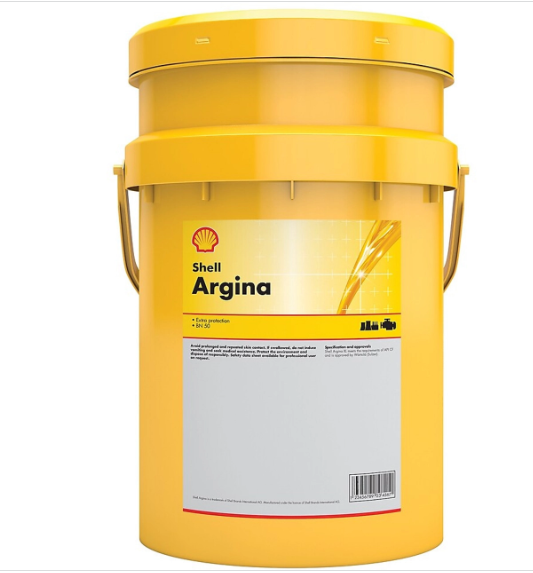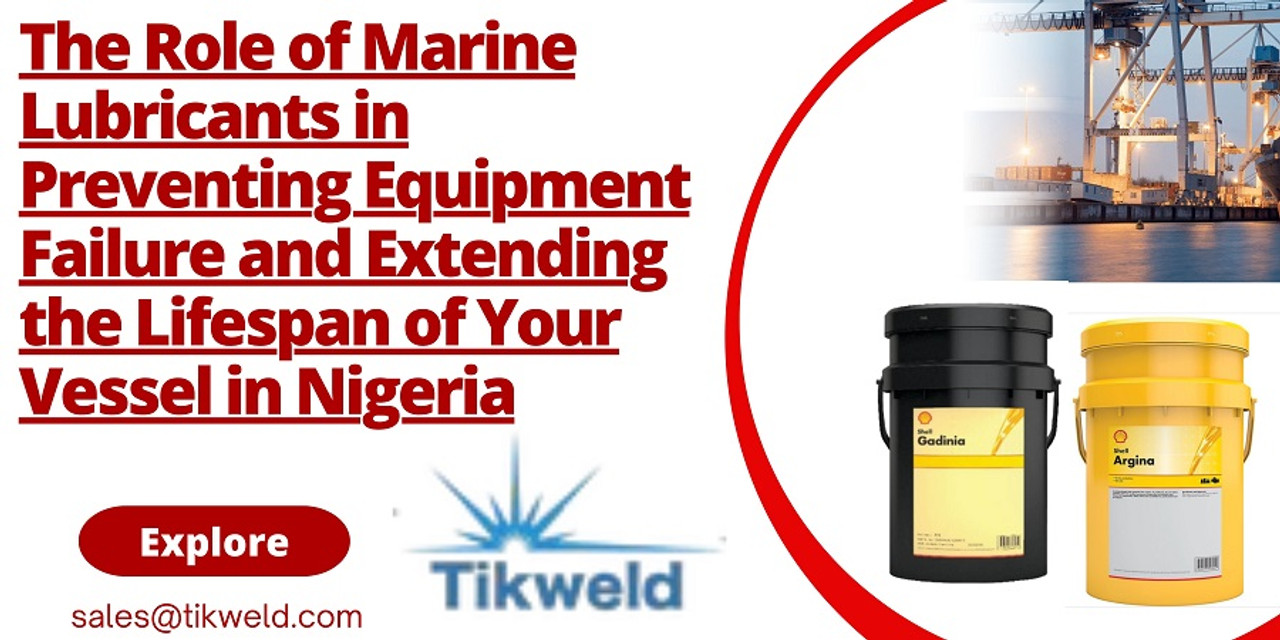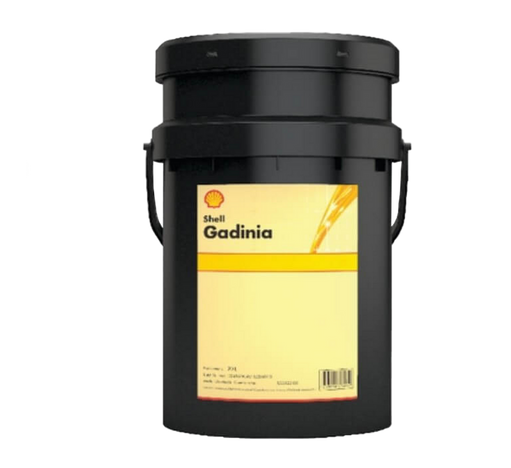The Role of Marine Lubricants in Preventing Equipment Failure and Extending the Lifespan of Your Vessel in Nigeria
Marine lubricants are specialized oils and greases used to reduce friction and wear between mechanical components in various types of marine equipment, including engines, gearboxes, and hydraulic systems. These lubricants are designed to withstand the harsh marine environment and to provide high levels of performance and protection for critical equipment on board ships and vessels.
Marine lubricants are essential components in maintaining the optimal performance of a vessel's machinery and extending their lifespan. The proper selection, storage, and application of these lubricants can have a significant impact on the vessel's operation and maintenance costs. In Nigeria, where the maritime industry plays a crucial role in the economy, the importance of marine lubricants like shell Argina S3, Shell Gadinia 40 and shell Mysella play a critical role in preventing equipment failure and ensuring the efficient and safe operation of vessels.
Understanding marine lubricants is essential for ship owners and operators to maintain the efficiency and reliability of their equipment and to prevent costly breakdowns and repairs. Proper lubrication can also help to extend the lifespan of the vessel and ensure compliance with environmental regulations. They are formulated with a range of additives and base oils, which provide specific properties such as viscosity, oxidation resistance, and corrosion protection. These properties are critical in determining the performance of the lubricant and its ability to protect the equipment.
This article aims to highlight the role of marine lubricants in preventing equipment failure and extending the lifespan of vessels in Nigeria. We will also explore the factors that contribute to equipment failure and the importance of proper lubrication in mitigating these risks.
Here are some of the ways in which marine lubricants can help prevent equipment failure and extend the lifespan of vessels:
1. Reducing friction and wear:
Marine lubricants help reduce friction and wear between the moving parts of a vessel's machinery, such as the engine, gearbox, and propeller. By creating a thin film of oil between the parts, lubricants help prevent metal-to-metal contact, which can cause wear and tear and eventual failure of the equipment. High-quality marine lubricants are formulated with additives that enhance their ability to reduce friction and wear, providing superior protection to the machinery.
2. Preventing corrosion:
Marine equipment is exposed to harsh environmental conditions, including saltwater and high humidity, which can cause corrosion. Marine lubricants contain additives that protect the metal surfaces from corrosion and rust, helping to extend the lifespan of the equipment.
3. Maintaining cleanliness:
Marine lubricants also help to keep the machinery clean by preventing the buildup of dirt and debris. Clean machinery runs more efficiently, reducing the risk of breakdowns and extending the lifespan of the equipment.
4. Improving fuel efficiency:
Using high-quality marine lubricants can help improve the fuel efficiency of a vessel's engine, reducing the amount of fuel required to operate the vessel. This not only saves on fuel costs but also reduces the environmental impact of the vessel's operations.
5. Ensuring compliance with regulations:
Nigeria, like many other countries, has regulations in place that require vessels to use environmentally friendly lubricants. Marine lubricants that meet these regulations are formulated with biodegradable materials, reducing the impact of their use on the environment.
Shell Gadinia 40 Marine Lubricant
How marine lubricants prevent equipment failure and improve performance
Marine lubricants play a vital role in preventing equipment failure and extending the lifespan of vessels by reducing friction, wear, and corrosion. The use of high-quality marine lubricants ensures that the internal components of the equipment are properly lubricated, reducing the stress and wear on moving parts.
When internal components of equipment are not properly lubricated, friction between the metal parts can cause wear, leading to equipment failure and costly repairs. The use of marine lubricants reduces friction, which reduces wear and prolongs the lifespan of the equipment.
In addition, marine lubricants help prevent corrosion of the equipment by forming a protective layer on the metal surfaces. This protective layer prevents rust and other forms of corrosion that can weaken and damage the equipment.
Marine lubricants also help to reduce the temperature of the equipment by dissipating heat away from the internal components. This reduces the risk of overheating, which can cause damage to the equipment.
Overall, the use of high-quality marine lubricants is essential for the proper functioning of marine equipment and the prevention of equipment failure.
Types of marine lubricants and their specific applications
There are several types of marine lubricants, each with specific properties that make them suitable for certain applications on vessels. Here are some common types of marine lubricants and their specific uses:
1. Mineral oils:
These are petroleum-based lubricants that are commonly used in engines, gearboxes, and hydraulic systems. They offer good lubrication properties and are cost-effective, but they have a shorter lifespan than synthetic oils.
2. Synthetic oils:
These are man-made lubricants that are designed to provide superior performance and longevity compared to mineral oils. They are often used in high-performance engines and machinery, and they are also more resistant to extreme temperatures and oxidation.
3. Bio-based oils:
These are made from renewable resources and are an environmentally-friendly alternative to petroleum-based lubricants. They are often used in applications where the risk of oil spills is high, such as hydraulic systems and stern tube bearings.
4. Greases:
These are lubricants that contain a thickener, which gives them a semi-solid consistency. They are often used in applications where a thicker lubricant is needed, such as open gears and wire ropes.
5. Additives:
These are compounds that are added to lubricants to improve their performance in specific applications. For example, anti-wear additives can help protect engine components from wear and tear, while anti-corrosion additives can protect metal surfaces from rust and corrosion.
Choosing the right type of marine lubricant for your vessel depends on several factors, such as the type of engine or machinery, the operating conditions, and the manufacturer's recommendations. It's important to consult with a reputable supplier or manufacturer to ensure that you are using the correct lubricant for your application.

Shell Argina S3 Marine Lubricant
Causes and consequences of equipment failure
Equipment failure is a serious issue that can have significant consequences for vessel owners and operators. It can result in costly repairs, downtime, and even safety risks for crew members and passengers. Some of the common causes of equipment failure in marine machinery include wear and tear, corrosion, overloading, overheating, and poor maintenance. These factors can cause critical components to malfunction, leading to operational problems and potentially catastrophic failure.
The consequences of equipment failure can be severe. It can lead to the breakdown of essential systems such as engines, propulsion, and steering, making the vessel unseaworthy. In some cases, it can even result in the loss of the vessel or the loss of life. Equipment failure can also have financial implications, as repairs and replacement of damaged equipment can be expensive and cause significant downtime.
In the marine industry, where vessels operate in harsh conditions and are subject to extreme stresses, the risk of equipment failure is even higher. This is where the role of marine lubricants becomes crucial, as they can help prevent equipment failure and extend the lifespan of the vessel. By providing critical protection against wear and corrosion, marine lubricants ensure that equipment operates efficiently and safely, reducing the risk of failure and costly downtime.
Case studies and real-life examples of equipment failure prevented by proper lubrication
Proper lubrication is critical in preventing equipment failure and improving performance, especially in harsh marine environments. There have been numerous real-life examples where proper lubrication has prevented equipment failure and increased the lifespan of vessels.
For example, in 2015, a cargo ship carrying containers experienced a main engine failure due to lack of proper lubrication. The engine was shut down, and the ship had to be towed to a port for repairs, causing significant financial losses and delays. Investigations showed that the main engine bearing had failed due to inadequate lubrication. The bearing had been worn down and had to be replaced, which was costly and time-consuming.
In another case, a tanker vessel was experiencing problems with its hydraulic system. The hydraulic pump had failed, and the vessel was unable to operate its cargo pumps, causing delays and losses. Investigations revealed that the hydraulic pump had failed due to inadequate lubrication. The system had not been properly maintained, and the hydraulic oil had become contaminated, causing premature wear and failure of the pump.
Proper lubrication could have prevented both of these equipment failures. Regular oil analysis and maintenance of the lubrication system would have ensured that the oil was clean and properly lubricating the equipment. This would have increased the lifespan of the equipment and prevented costly breakdowns and repairs.
In conclusion, proper lubrication is essential in preventing equipment failure and improving the performance of marine vessels. Case studies and real-life examples have shown that inadequate lubrication can lead to costly breakdowns and repairs. Therefore, it is essential to use the right type of marine lubricants for specific applications and ensure that they are stored, handled, and transferred correctly to prevent contamination and degradation. Regular maintenance and inspection of the lubrication system can also help to prevent equipment failure and extend the lifespan of vessels.
Factors to consider when selecting marine lubricants
There are several factors to consider when selecting marine lubricants. These include:
1. Application:
The type of equipment or machinery to be lubricated will determine the type of lubricant needed. Different applications may require different viscosities, additives, and base oils.
2. Compatibility:
The lubricant selected should be compatible with the equipment and materials it will be in contact with. Incompatibility can result in damage to equipment and shortened lubricant life.
3. Operating conditions:
The environment in which the equipment operates will influence the lubricant's performance. Extreme temperatures, pressure, and humidity levels can affect lubricant properties, and the lubricant selected should be appropriate for the specific operating conditions.
4. Manufacturer's recommendations:
Equipment manufacturers often provide recommendations for lubricants to use in their equipment. Following these recommendations can help ensure optimal performance and prolong equipment life.
5. Cost:
The cost of the lubricant and its maintenance should be considered when selecting a lubricant. A high-quality lubricant may be more expensive, but can provide cost savings in the long run by reducing equipment downtime and repair costs.
6. Regulatory compliance:
Marine lubricants must comply with international regulations and standards. Compliance with environmental regulations is also important, as improper disposal of lubricants can have negative impacts on the environment.
7. Supplier reliability:
The reliability and reputation of the lubricant supplier should also be considered when selecting a lubricant. A reputable supplier can provide quality products and support for their customers.
Find out: How to Choose the Right Marine Lubricant Supplier in Nigeria: A Guide for Ship Owners and Operators
Proper storage and handling of marine lubricants
1. Suitable Storage Location and Container Selection:
Proper storage of marine lubricants is crucial to maintain their quality and prolong their shelf life. The storage location should be clean, dry, and well-ventilated, and free from direct sunlight, rain, and other sources of heat. Additionally, it should be equipped with secondary containment to prevent any spills or leaks from contaminating the environment.
Container selection is also an important consideration when it comes to storing marine lubricants. The containers should be made of high-quality materials, such as steel or plastic, and should be able to withstand the corrosive effects of the lubricants.
2. Temperature and Humidity Control:
Temperature and humidity are critical factors in the storage and handling of marine lubricants. Exposure to extreme temperatures and humidity can cause the lubricants to break down and lose their effectiveness. Therefore, it is essential to store marine lubricants in a controlled environment with optimal temperature and humidity levels.
3. Avoiding Contamination and Mixing of Different Types of Lubricants:
Contamination and mixing of different types of lubricants can cause significant damage to the engine and other components. Therefore, it is important to ensure that the lubricants are not contaminated with water, dirt, or other foreign materials. Mixing different types of lubricants can also lead to chemical reactions and produce harmful substances that can damage the engine.
4. Proper Transfer and Dispensing Techniques:
Proper transfer and dispensing techniques are essential to prevent spills, leaks, and other incidents that can cause harm to the environment and people. The use of appropriate equipment, such as pumps and hoses, can help prevent spills and ensure accurate dispensing of the lubricants.
5. Regular Inspection and Maintenance of Equipment:
Regular inspection and maintenance of the equipment are critical to ensure the effectiveness of the lubricants and prevent equipment failure. Inspections should include checks for leaks, wear, and other signs of damage, and maintenance should be performed as recommended by the manufacturer.
6. Regulatory and Environmental Considerations:
Marine lubricants are subject to various regulations and environmental considerations. Therefore, it is important to select lubricants that comply with relevant regulations and standards and do not pose a risk to the environment. Additionally, the storage and handling of marine lubricants should be done in a manner that meets regulatory requirements and minimizes the impact on the environment.
Best practices for extending the shelf life of marine lubricants
Tips for Proper Storage and Handling of Marine Lubricants:
- Store lubricants in a cool, dry, and well-ventilated area away from direct sunlight and heat sources.
- Keep lubricants in their original, sealed containers until they are ready to be used.
- Use dedicated containers and dispensing equipment for each type of lubricant to prevent contamination.
- Label all containers and equipment clearly to avoid confusion.
- Use proper lifting and handling techniques to avoid spills or damage to containers.
- Follow the manufacturer's recommended shelf life and storage conditions for each lubricant.
- Conduct regular inspections of storage areas and containers to identify any signs of contamination, deterioration, or damage.
Common Mistakes to Avoid in the Storage and Handling of Marine Lubricants:
- Storing lubricants near heat sources or in direct sunlight, which can lead to degradation and loss of performance.
- Mixing different types of lubricants or using improper containers and equipment, which can lead to contamination and reduced effectiveness.
- Not following the manufacturer's recommended storage and handling guidelines, which can lead to premature degradation and failure of the lubricant.
- Using expired or deteriorated lubricants, which can lead to reduced performance and equipment failure.
- Not conducting regular inspections of storage areas and containers, which can result in undetected contamination or damage.
By following these tips and avoiding common mistakes, you can ensure that your marine lubricants are stored and handled properly, leading to optimal performance and increased lifespan of your equipment.
Conclusion
Marine lubricants play a crucial role in preventing equipment failure and extending the lifespan of vessels. By reducing friction and wear, lubricants ensure the smooth operation of moving parts, prevent corrosion, and improve the performance of equipment. Proper lubrication can also reduce maintenance costs, downtime, and the risk of accidents, thus ensuring the safety of crew, passengers, and cargo.
marine lubricants also maintains cleanliness, improving fuel efficiency, and ensuring compliance with regulations, high-quality marine lubricants provide superior protection to the machinery and help ensure the safe and efficient operation of vessels in Nigeria's waters. It is crucial to choose the right marine lubricant for your vessel and to ensure that it is regularly serviced and maintained to maximize its benefits.
Proper lubrication and maintenance practices are essential to ensure the safety, efficiency, and longevity of vessels. By selecting and storing the right marine lubricants correctly, and also using proper transfer and dispensing techniques, vessel operators can minimize the risk of equipment failure and improve performance. Regular inspection and maintenance of equipment, as well as compliance with regulatory and environmental requirements, are also crucial to maintaining safe and sustainable operations.
Key Takeaways from the Article
- Marine lubricants are specially formulated to withstand the harsh conditions of marine environments and provide optimal performance for specific applications.
- Factors to consider when selecting marine lubricants include equipment type, operating conditions, compatibility with materials, environmental regulations, and cost.
- Proper storage and handling of marine lubricants are essential to ensure their quality and effectiveness. This includes storing them in a suitable location, selecting the right container, controlling temperature and humidity, avoiding contamination, and using proper transfer and dispensing techniques.
- Common mistakes to avoid include storing lubricants in inappropriate locations, using contaminated containers or equipment, mixing different types of lubricants, and neglecting regular inspection and maintenance of equipment.
- Regular inspection and maintenance of equipment are critical to identify and correct any issues that could lead to equipment failure or safety hazards.
- Compliance with regulatory and environmental requirements is essential to protect the environment and ensure sustainable operations.
Contact Tikweld welding supplies and services for enquiries on marine lubricants.








